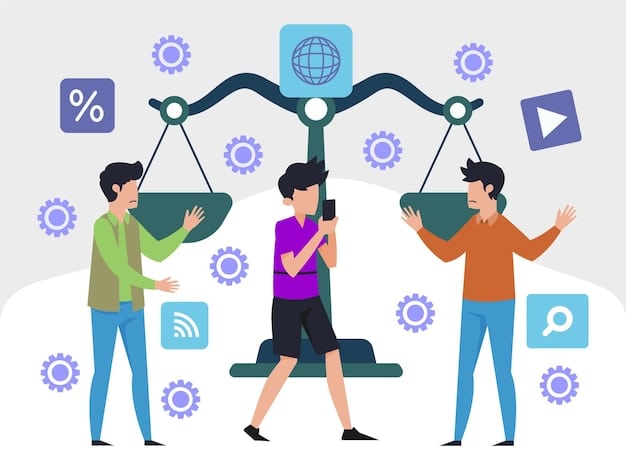The Future of AI: 4 Predictions for the US Tech Industry

The Future of AI: 4 Predictions for the US Tech Industry in the Next 12 Months include accelerated AI adoption across sectors, heightened cybersecurity threats, increased demand for AI ethics and governance frameworks, and a surge in AI-driven automation impacting the workforce.
The tech industry is bracing for a seismic shift as artificial intelligence continues its relentless march forward. What does The Future of AI: 4 Predictions for the US Tech Industry in the Next 12 Months really look like? Get ready to explore the key trends shaping the next year.
Accelerated AI Adoption Across Key US Industries
Artificial intelligence is swiftly moving from the realm of abstract innovation to a practical tool integrated into numerous sectors. This acceleration marks a pivotal moment for industries aiming to leverage AI for enhanced efficiency and strategic advantage.
Here, we examine the specific ways AI is expected to transform leading sectors within the US tech landscape.
Healthcare Revolutionized by AI
The healthcare industry stands to gain significantly from AI advancements. Expect AI-driven diagnostics, personalized treatment plans, and robotic surgery to become more commonplace. These implementations promise improved patient outcomes and streamlined healthcare processes.
Financial Services Transformed with AI
AI’s role in financial services will escalate in the coming year. Algorithmic trading, fraud detection, and personalized financial advice powered by AI will provide consumers with better services and enhance security measures across financial institutions.
- 🤖 Enhanced fraud detection systems
- 📈 Algorithmic trading for optimized investments
- 👨⚕️ Personalized healthcare treatment plans
From healthcare to finance, the widespread integration of AI technologies promises to redefine how businesses operate and deliver value. By focusing on these transformative applications, the tech industry is poised to unlock new levels of innovation and efficiency.

Heightened Cybersecurity Threats Due to AI
The increasing sophistication and integration of artificial intelligence also bring forth new challenges in cybersecurity. As AI becomes more prevalent, it presents novel opportunities for malicious actors to exploit system vulnerabilities.
Understanding these evolving threats is essential for developing robust defense strategies.
AI-Powered Cyberattacks
AI’s ability to automate and optimize processes can be weaponized to launch sophisticated cyberattacks. Expect to see more AI-driven phishing campaigns, malware deployment, and autonomous hacking tools targeting critical infrastructure.
Defending Against AI Threats
To counter these threats, cybersecurity firms are turning to AI for defense. AI-driven threat detection, anomaly recognition, and automated incident response can help identify and neutralize cyberattacks more effectively than traditional methods.
- 🛡️ AI for automated threat detection
- 🔑 Enhanced encryption methods
- 🚨 Real-time anomaly recognition
Addressing the rising tide of AI-related cybersecurity risks will require a proactive and adaptive approach. By leveraging AI for both offense and defense, the tech industry can stay ahead of potential threats and better protect sensitive data.
Increased Demand for AI Ethics and Governance Frameworks
As AI systems become more deeply integrated into critical decision-making processes, ethical considerations and governance frameworks are gaining prominence. This shift is driven by the need to ensure fairness, transparency, and accountability in AI applications.
Establishing clear ethical guidelines and robust governance structures is essential for fostering trust and mitigating potential risks.
The Push for Ethical AI
Consumers, regulators, and businesses are increasingly demanding that AI systems adhere to ethical principles. Bias detection and mitigation, data privacy, and algorithmic transparency are key areas of focus. Companies that prioritize ethical AI practices are more likely to build consumer confidence and comply with evolving regulatory standards.
AI Governance and Regulation
Governments worldwide are developing regulatory frameworks to govern the development and deployment of AI technologies. These regulations aim to address issues such as data protection, intellectual property, and liability. The US tech industry must proactively engage with policymakers to shape these regulations and ensure they foster responsible innovation.

Investing in AI ethics and governance is not only a matter of compliance but also a strategic imperative. Companies that embrace ethical AI practices and proactively engage with regulators will be better positioned to thrive in the evolving technology landscape.
Surge in AI-Driven Automation Impacting the Workforce
The surge in AI-driven automation is reshaping the US tech industry and the broader workforce. As AI takes over routine tasks, there is a growing need to adapt to new job roles and skill requirements.
Understanding the implications of this shift is crucial for businesses and workers alike.
Rise of Automation
AI-driven automation is expected to accelerate across various sectors. Manufacturing, logistics, customer service, and even creative fields are seeing increased adoption of AI-powered tools. This trend is leading to higher productivity and reduced operational costs but also raises concerns about job displacement.
Upskilling and Reskilling Initiatives
To mitigate the impact of automation on the workforce, companies and educational institutions are investing in upskilling and reskilling programs. These initiatives aim to equip workers with the skills needed to thrive in an AI-driven economy. Data science, AI ethics, and AI governance are becoming essential competencies for tech professionals.
- 📚 Upskilling programs for AI-related jobs
- 🤝 Government & industry partnerships to create jobs
- 🧠 Focus on data science & AI ethics skills
To prepare for the future, companies must proactively invest in their workforce to ensure the workforce adapts efficiently. By focusing on strategic initiatives that prioritize innovation and inclusivity, the US tech industry can create new opportunities and foster a more resilient and agile workforce.
| Key Point | Brief Description |
|---|---|
| 🚀 AI Adoption | AI is rapidly being integrated across healthcare and finance sectors. |
| 🔒 Cybersecurity Risks | Sophisticated cyberattacks powered by AI are on the rise. |
| ⚖️ AI Ethics | Growing demand for transparent and ethical AI governance frameworks. |
| ⚙️ Automation Impact | AI-driven automation transforming the workforce, necessitating upskilling. |
FAQ
▼
Healthcare and Finance are at the forefront, using AI for diagnostics, personalized treatments, algorithmic trading, and fraud detection.
▼
AI enhances both cyberattacks and defenses, enabling more sophisticated threats and automated security measures to counter them effectively.
▼
As AI influences critical decisions, there’s a growing need to ensure fairness, transparency, and accountability, driving demand for ethical guidelines.
▼
AI-driven automation transforms jobs, leading to workforce adaptation through upskilling. It’s also necessary for companies to prioritize employee skills development.
▼
Companies and educational institutions are heavily investing in upskilling and reskilling programs. These programs often focus on essential skills such as data science and AI ethics.
Conclusion
As we look ahead, it’s clear that AI will continue to reshape the US tech industry in profound ways. By focusing on innovation, ethical considerations, and proactive workforce adaptation, the United States can navigate this transformative period and consolidate its position as leader in AI.





